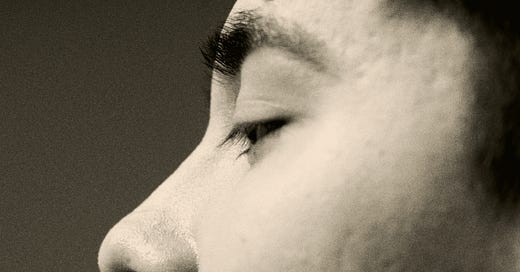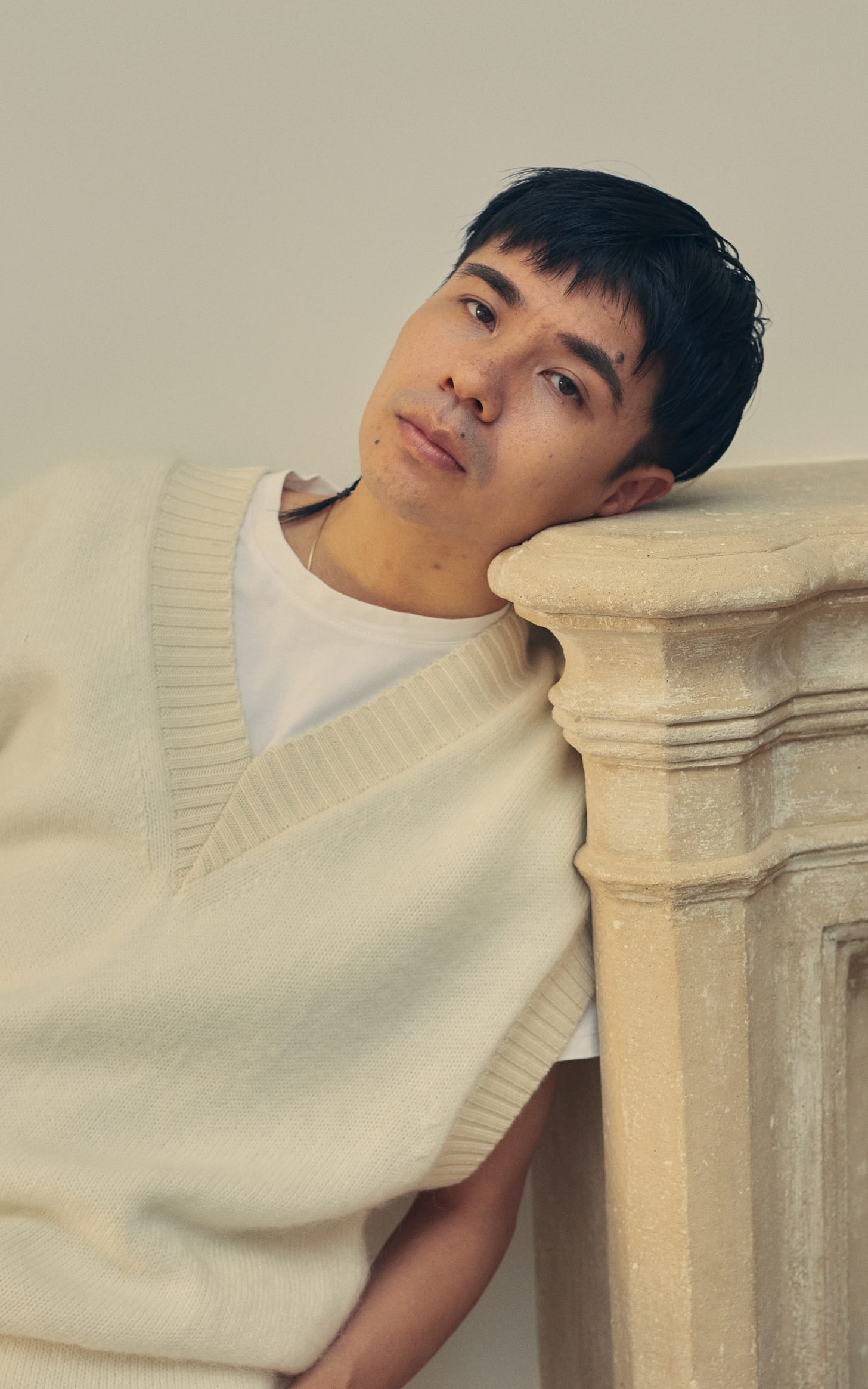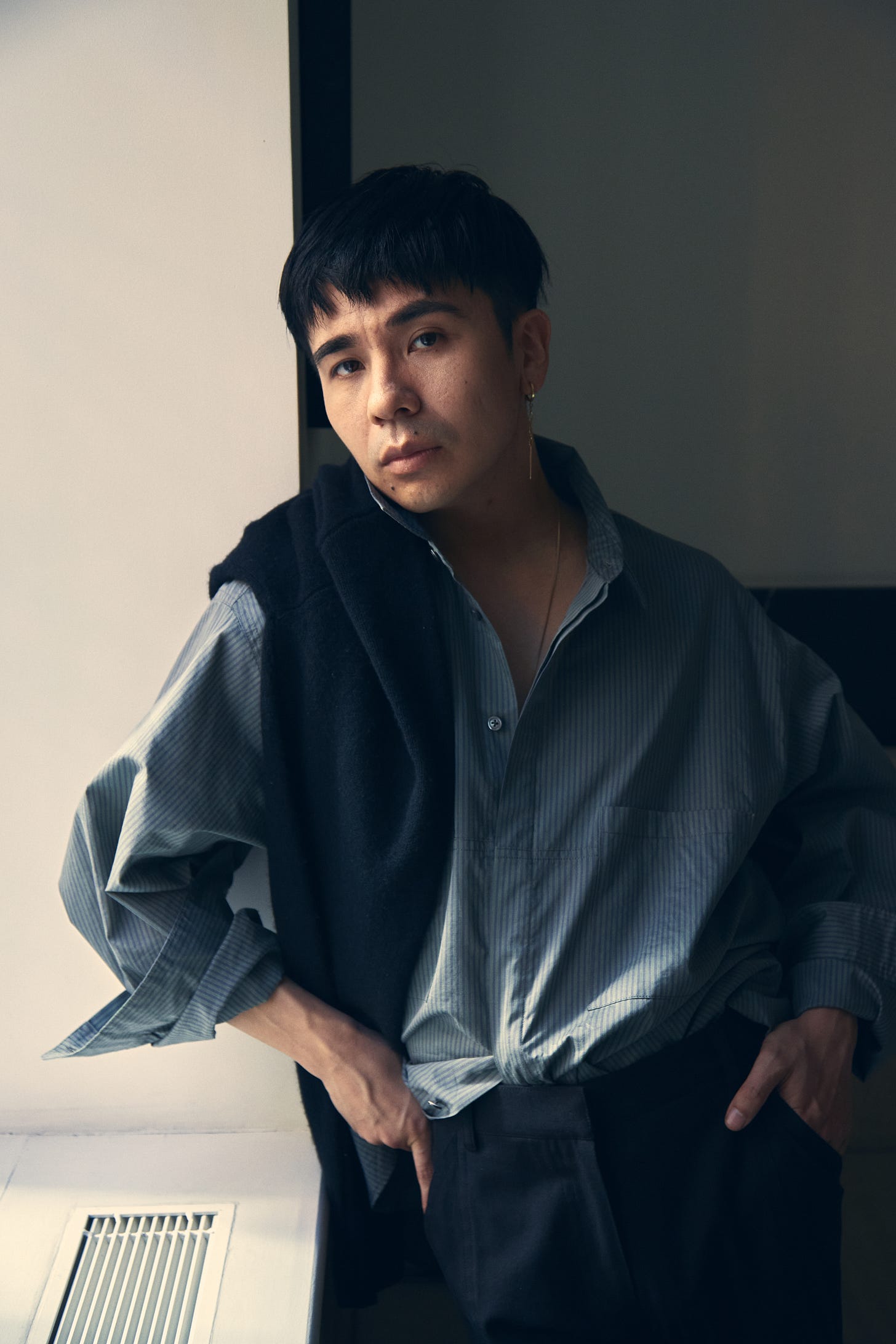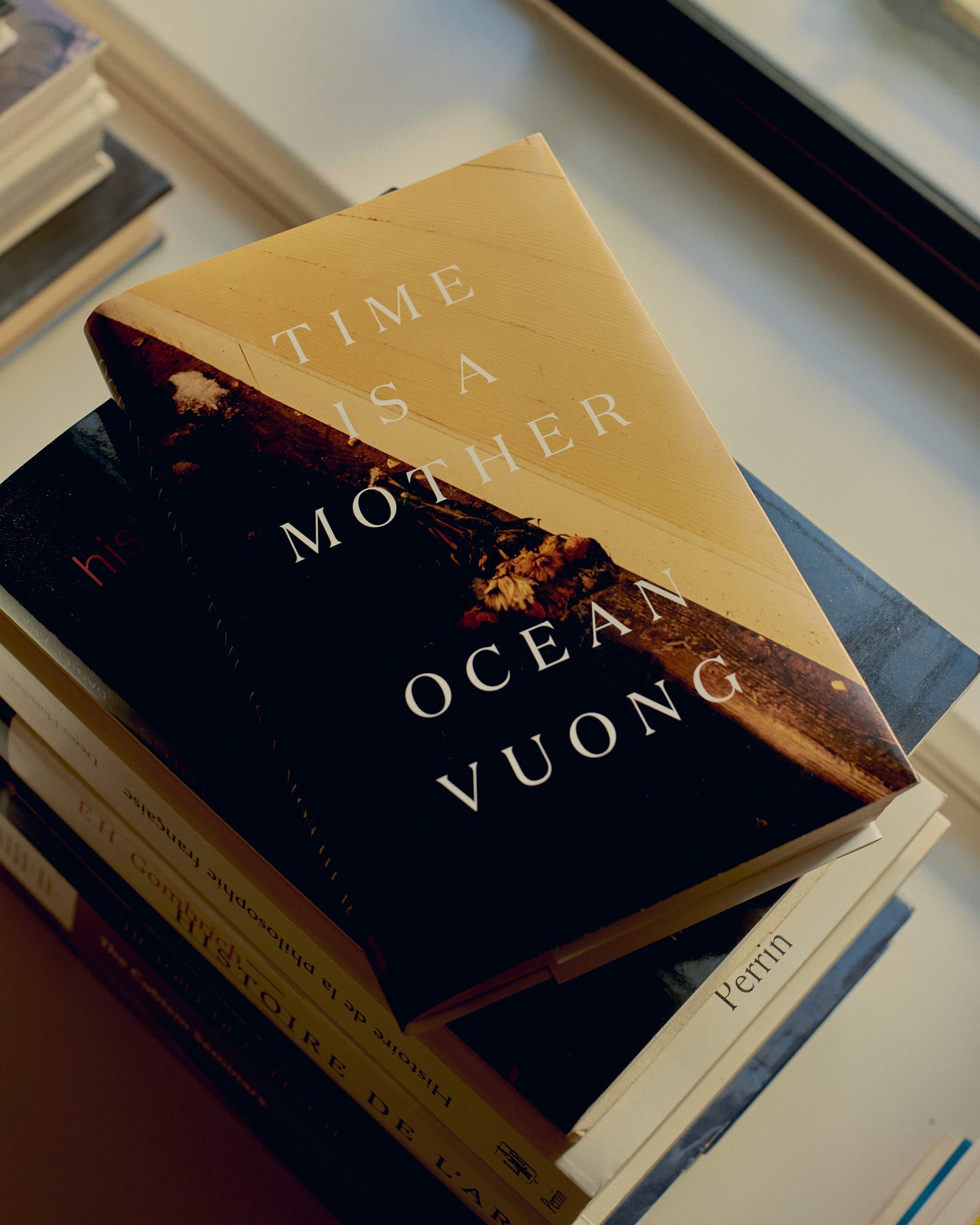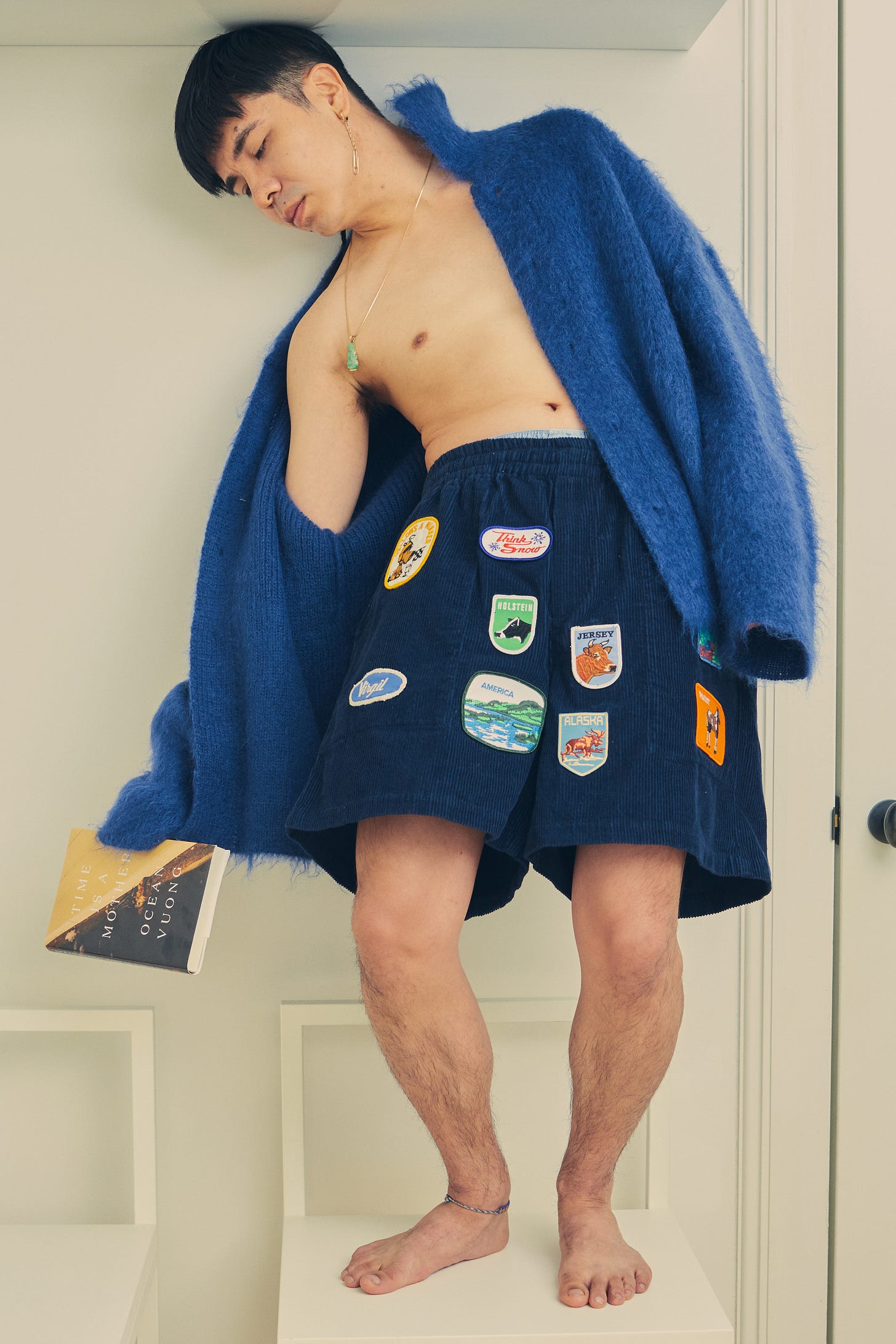Ocean Vuong: The GAYLETTER Interview
"As an artist, I’m interested in not turning my art into purely an oppositional project because when you’re always in opposition, you always speak second."
Welcome to a new edition of GAYLETTER. Today we speak with the one and only Ocean Vuong.
A novelist, poet and professor, Ocean’s first book ‘On Earth We’re Briefly Gorgeous’ catapulted him to international fame.
We shot Ocean in our friend’s gorgeous apartment near lower 5th in Manhattan. We had only 40 minutes of his time, and about a 100 looks to try on. While we buzzed about like the caffeinated queens we are, Ocean was a sea of calm amongst it all — gracious, thoughtful, everything you might expect from this talented novelist and poet.
Ocean is in a rare field, gaining name recognition as a poet is a major fete, but one he rightfully earned through his unique talent and hard work.
Please enjoy this super insightful conversation with Ocean below, he talks about gender in a way I haven’t heard it discussed before. Super interesting.
Chris Stewart @_chrisstewart is our guest editor for the wonderful conversation with Ocean.
-Tom
TEXT BY CHRIS STEWART
PHOTOGRAPHY BY FUJIO EMURA
STYLING BY SHO TATSUISHI
It is impossible to ignore Ocean Vuong’s accolades: He’s won a MacArthur Genius Grant, a Whiting Award, the T.S. Eliot Prize for Poetry, and in 2019 his novel On Earth We’re Briefly Gorgeous was long-listed for the National Book Award while spending several weeks on the New York Times Best Seller list. His lyrical name is recognized outside of the literary circuit. Only so many authors are; many of them dead. That is to say, Ocean is not in the company of many contemporaries.
While the ‘public intellectual’ has been called an endangered species, Ocean is one of the few we have writing today. This is more surprising given his lack of a Twitter presence, where writers often gain popularity for pontificating on anything and everything. Still Ocean, earning continued praise for his deft craftsmanship, is rarely far from the literary conversation. He is a writer’s writer — most comfortable at his desk, mulling over the pliability and banality of language.
Ocean broke out in 2016 with his debut collection of poetry Night Sky With Exit Wounds (Copper Canyon Press). He enjoyed critical success and more. Fashion magazines, fashion brands, and even Netflix came knocking. Ocean, his star-ascendant, has made, and is making, poetry cool again.
Time Is A Mother, Ocean’s second collection of poems, arrives at a very different moment. While she lived long enough to see her son’s phenomenal success, in November 2019, Ocean’s mother passed away. She figures prominently in his first books as the central pillar of his matriarchal, immigrant family. The poems in Time Is A Mother turn away from Ocean’s previous style. Clear narratives expand into more associative timelines while representational imagery gives way to impressionistic scenes. Generally, the speaker of the poems is much less defined than in Ocean’s previous work. In Night Sky and On Earth, Ocean succeeded in making himself legible — as a poet, as a gay man, as an Asian-American.
Time Is A Mother enjoys similar moments of legible identities, but the collection is most exciting as it deviates from preconceived ideas of Ocean’s poetry; that it is beautiful, and not too complex. Ocean’s new work puts forward a more experimental point of view. The speaker drifts into the banal, where poetry finds reality, rather than searching for realities that can become poetry. The book signals a great shift in the poet’s thinking.
Old Glory Knock ’em dead, big guy. Go in there guns blazing, buddy. You crushed at the show. No, it was a blowout. No, a massacre. Total overkill. We tore them a new one. My son’s a beast. A lady -killer. Straight shooter, he knocked her up. A bombshell blonde. You’ll blow them away. Let’s bag the broad. Let’s spit-roast the faggot. Let’s fuck his brains out. That girl’s a grenade. It was like Nam down there. I’d still slam it though. I’d smash it good. I’m cracking up. It’s hilarious. You truly murdered. You had me dying over here. Bro, for real though, I’m dead. From TIME IS A MOTHER by Ocean Vuong. Reprinted by arrangement with Penguin Press, a member of Penguin Group (USA) LLC, A Penguin Random House Company. Copyright © Ocean Vuong, 2022.
When she died, I just felt I could do whatever I want, like what’s the point of all this.
Time Is A Mother feels very different — contextually, sonically, and formally — from your debut collection, Night Sky With Exit Wounds. What is your formal relationship to these new poems? I’m proud of everything I’ve done. That doesn’t mean there are not regrets. If I had a shot at editing every page I’ve ever written, I would probably take it. And every page would be a little different, even just moving a comma. One thing that’s a stark difference between this book and the others is that I didn’t feel like all of myself were in the other books. My sentiment, my sensibility, with humor, the calling of more pop culture and really using all registers, of lexicons and vernaculars, colloquial, regional speech. One of my heroes is C.D. Wright, and I’ve always been trying to write towards her capacious use of varying levels of dialects. That’s what I’ve always reached for. You know, like any debut — I debuted twice — there’s a lot of self-consciousness and uncertainty. After my mother died, I was just like, Fuck it. Everything I did was for her.
When she died, I just felt I could do whatever I want, like what’s the point of all this. It was like swinging between two extremes. Either, it was just forget it, like, there’s no point in writing, or — it was during COVID — I was like everybody else; depressed and uncertain, and grieving. Personally, my mother died in November [of 2019], and COVID happened in March, a few months later. So I felt liberated. It’s a word that I don’t use often.
Keep reading with a 7-day free trial
Subscribe to GAYLETTER by Tom & Abi to keep reading this post and get 7 days of free access to the full post archives.


